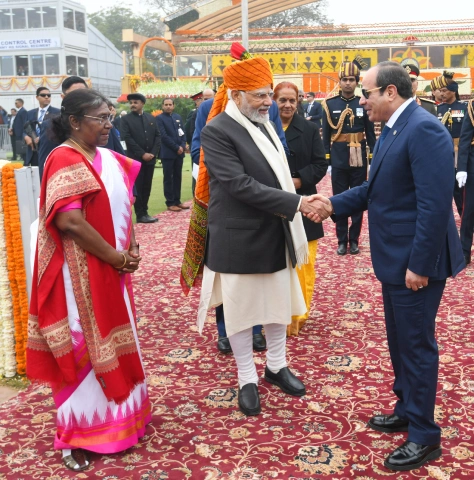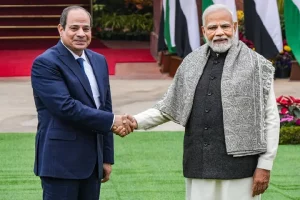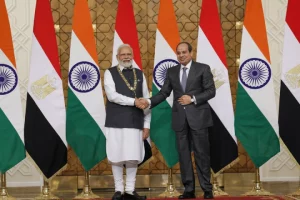Mahua Venkatesh
India and Egypt have quietly but aggressively pressed the pedal on resetting ties as new geopolitical dynamics throw up fresh challenges as well as opportunities. Later this month, Prime Minister Narendra Modi is expected to visit Cairo on his way back from Washington. India’s support to Egypt which is battling an economic crisis at home due to the Russia-Ukraine war will be crucial. Amid China’s advances in Africa, “India must find ways to enhance its maritime and energy security cooperation,” the Geopolitics said. India has also invited Egypt as a guest at the G20 deliberations under its one year presidency.
A middle power, with a commanding presence in the Red Sea — the gateway to the Mediterranean Sea via the Suez Canal – Egypt also has an influential presence in the Horn of Africa, as well as North Africa, including resource-rich Libya, with which it shares a common border. It also enjoys excellent relations with the Gulf countries especially the United Arab Emirates and Saudi Arabia.
Egypt can play a major role in India’s Indian Ocean Strategy, especially as 500,000 barrels of oil sourced from the United States, Latin America and Algeria passes through the Egypt-controlled Suez Canal.
Modi’s visit to the North African country could culminate in concrete bilateral deals and announcements which would boost ties between the two nations. This year, Egyptian President Abdel Fattah al-Sisi was the chief guest at the Republic Day celebrations.
A host of Indian companies are eyeing investments in Egypt, which provides a crucial link between Asia and Africa and also controls the Suez Canal –a primary channel for global trade between waters connecting Europe with the Indo-Pacific. Indian investments in Egypt are estimated at $$3.15 billion but fresh investments are already lined up for the upcoming years.
For India, a deeper economic engagement with Egypt therefore acquires an additional strategic imperative, the Observer Research Foundation said.
According to the news organisation, India-Egypt ties provide many other opportunities, including a prospective Egypt-GCC-India or Egypt-I2U2 partnership enabling the countries involved to benefit from what each offers. “India and Egypt can take the lead in exploiting the potential of bilateral and multilateral cooperation in science and technology, agriculture, and water technology, among others,” it said.
India and Egypt have also established the foundations of a promising military relationship during President El-Sisi’s visit.
“Strengthening cooperation in the defence field is the best proof of the common will to inaugurate a strategic relationship between the two countries. We affirmed the continuation of coordination, joint training, exchange of experiences and work to explore additional horizons to deepen cooperation in that field, including co-manufacturing,” El Sisi said during his speech at the Hyderabad House.
Egypt is now looking to use the Indian rupee for bilateral trade. Besides, New Delhi is in the process of providing a line of credit to Cairo.
In 2022, trade between India and Egypt recorded the highest ever touching $7.26 billion. Crude petroleum, fertilizers, cotton yarn were among the most prominent items that were traded between the two.
Also Read: Why Egyptian President al-Sisi’s visit can expand India’s strategic horizons
















